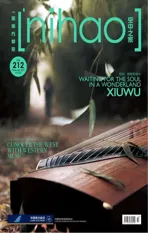Hidden Gem In Central Plains
2017-04-27TextTranslationsbyWengRongPhotosbyZengjian
Text &Translations by Weng Rong Photos by Zengjian
Hidden Gem In Central Plains
Text &Translations by Weng Rong Photos by Zengjian
中原藏宝

Xiuwu - the cultural centre of the district of the Yellow River - continues to bring to the world various forms of art pieces.
The art of Xiuwu is neither too close to the capital, nor is it too far away to be considered isolated. By keeping a comfortable distance from the madding crowd, it waits patiently for those looking for peace of mind.
修武之艺,得益于黄河文化中心区地缘之利,更得益于山水自然的恩赐。
不似庙堂之高,亦不似江湖之远,像一枚藏于河洛之间、太行脚下的璞玉,恬然生长,静待世人的偶遇。
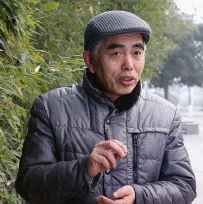
Yang Tianliang
Ex-Curator of Xiuwu Cultural Relics Museum
杨天亮
修武县文物博物馆原馆长
A Thousand Years of Free Spirit
NIHAO: Why did the “seven sages of bamboo grove” choose Xiuwu as their place of seclusion?
Yang:Xiuwu is close to both Luoyang and Xuchang, the capital and second capital of the country at the time, which made it convenient for the sages to stay up-to-date with current affairs. In addition, Jia Kang and Wang Rong (two main member of seven sages of bamboo grove ) came from notable families that possessed land in the area. Unlike poet Tao Yuanming, who quit his official position and lived a peaceful life in the countryside, the “seven sages” retreated to avoid the dangerous political situation in the capital city. Instead of fighting against the current, they chose to stay somewhere safe, where they could maintain their peace of mind, whilst expressing their anguish via poems and songs. The quiet and beautiful environment in Xiuwu surely was another reason for them to come. Also, they could find all kinds ofherbs that they needed to invent the pills that they believed would help them achieve immortality.
NIHAO: What impact did the sages have on Xiuwu?
Yang:They have left a great amount of cultural relics such as the stone terrace that Liu Ling used to sober up on, the pond where Ji Kang used to make swords, etc… Apart from historic relics, the sages have also greatly influenced the later generations with their free spirit and their attitude towards corruption and evil. Take myself as an example - I have learnt to chase after things that I have true passion for, since the sages have taught us to follow one's natural character.

Around 1,700 years ago, seven young and talented poets, musicians and scholars came to live in seclusion in Yuntai Mountain. Their days consisted of drinking, sightseeing, writing, and having debates on metaphysics. They were later named the “seven sages of bamboo grove”.
1700多年前,竹林七贤隐居百家岩,寄情山水,饮酒谈玄。
千年魏晋风
NIHAO:为什么竹林七贤会选择到修武隐居?
杨:首先,这里靠近陪都许昌和京都洛阳,且嵇康的妻子长乐亭公主、王戎在此皆有封地。山涛和向秀的家也在距此几十里的怀县。与陶渊明不一样的是,竹林七贤并非想完全出世。他们表面上远离官场,实际上仍然忧心政治,无奈当时政治环境凶险,唯有选择在离政治中心不远的地方隐居,用诗曲宣泄苦闷与忧生之嗟。其次,修武环境清幽,竹林广袤,云台山上有很多药草,是很多修道炼丹之人聚集地,所以,非常适合修道谈玄。
NIHAO:竹林七贤给修武留下什么印记?
杨:从历史遗迹上说,竹林七贤在百家岩留下了嵇山、刘伶醒酒台、嵇康淬剑池等大量遗迹,为修武县留下珍贵的文化遗产。从思想上看,竹林七贤清峻达观、不与腐败政治同流合污的潇洒风骨和自由的人格精神,持续引发后人的深思与向往。比如,我本人在多年研究竹林七贤思想的过程中,也逐渐变成了一个更豁达的人,做自己热爱的事情。竹林七贤所推崇的“自然本性”,也潜移默化地留存下来,修武人普遍很重视修身养性。

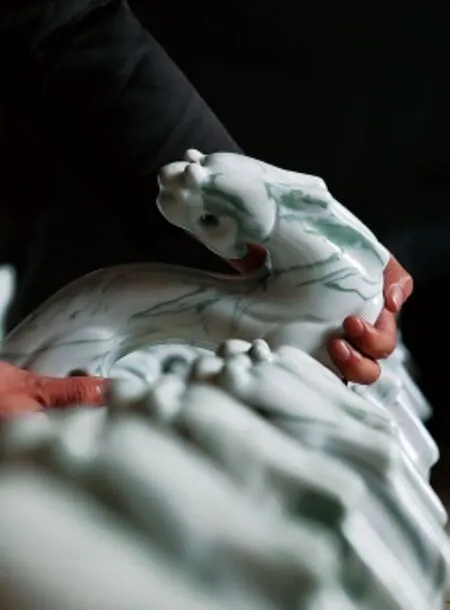
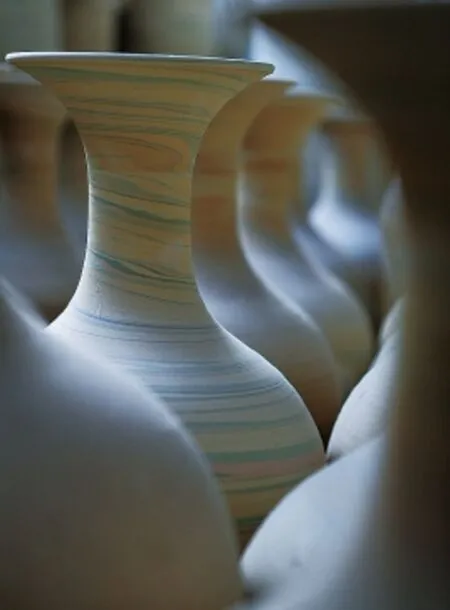
Chai Zhanzhu
Inheritor of the national intangible cultural heritage - porcelain with twistable clay body
柴战柱
绞胎瓷制作技艺国家级传承人
Gentleman Porcelain
NIHAO: What are the main features of Dangyangyu kiln porcelain with a twistable clay body?
Chai:Dangyangyu Kiln porcelains are especially famous for their patterns, which are exactly the same from the inside out. To create this kind of effect, the potter arranges and mixes different colours of clay together, instead of painting or engraving on the surface of the ceramics. Chinese Philosopher Mencius famously said: “A gentleman's appearance corresponds to the inside.” It is because of this feature that porcelain with twistable clay is also called “gentleman porcelain”. Its second biggest feature is its more than 160 kinds of sophisticated patterns. Apart from traditional patterns like lotus, birds and beasts, Dangyangyu kiln has also come up with many unique patterns, such as tadpoles and splashes of water.
NIHAO: What made Xiuwu the centre of porcelain making in the past?
Chai:In the Northern Song Dynasty, Xiuwu became the porcelain manufacturing centre. The area was apt for three reasons: its suitable porcelain clay, convenient water transport network, and its extensive history of pottery making. Xiuwu is one of the birthplaces of Chinese porcelain. Ning Fengzi, the first pottery minister in China's history was born in Xiuwu, during the Emperor Huang dynasty. With his influence, Xiuwu came up with plenty of skilled potters, who formed a complete industry chain with the local Dangyangyu kiln. They invented porcelains with solid clay body and a shiny glaze. Meanwhile, Xiuwu was close to the political centre at that time. A lot of masterpieces produced in Xiuwu had been sent to the imperial palace. This is also why Dangyangyu porcelain offers an accurate taste of the royal class in Northern Song Dynasty.
NIHAO: What are the main difficulties in producing porcelain with a twistable clay body?
Chai:The hardest part is burning the semi-finished product. Different colours of clay have different swell factors when under 1200 degree centigrade. Even slightly over-heated could lead to cracking. Its high production cost inevitably also led to a higher retail price than other types of porcelain. That's why Dangyangyu porcelain used to be a luxury that only the aristocracy have access to.
瓷中君子
NIHAO: 当阳峪窑绞胎瓷有什么艺术特点?
柴:绞胎瓷最大的特点在于它的纹饰“表里如一”:通过将不同颜色的泥土盘编糅合,制作者在瓷胎里直接做出纹饰,而非在表面进行剔划绘画,因此,作品不论是从内部还是从外部看,花纹都一模一样。绞胎瓷也因此被称为“君子瓷”,具有美好的象征意义。绞胎瓷的第二大特点是其纹饰复杂、考究。除了莲花水藻纹、鸟兽纹、麦穗纹等纹理外,当阳峪窑绞胎瓷还发展出了蝌蚪纹、散点纹等独具特色的纹饰品种。它的装饰品种达160多种,代表了当时最高的制作工艺。
NIHAO: 修武为什么能够成为当时的瓷都?
柴:北宋时,修武成为中原地带的重要瓷都,一方面因瓷土丰富、水运网络发达,另一方面是因为修武有着悠久的制陶历史。黄帝时期,中国历史上第一任陶正(制陶官)宁封子便生于修武,使得当地出了很多技艺高超的工匠。修武当阳峪窑在此地形成产业,发展出胎质细密坚硬,釉色油润光亮的绞胎瓷,可以说是我国陶瓷文化的根源所在。其次,它离当时的政治中心近,多数出品运进皇宫,也代表和引领那个时代对瓷器的审美喜好。
NIHAO:绞胎瓷制作主要难点在哪?
柴:绞胎瓷制作成品率低,最大的难度在烧制上。不同颜色的胎泥在1200度高温下的膨胀系数不一样,一旦烧制过度则容易开裂,制作成本和价格更高,也因此限制了绞胎瓷的发展和普及。长久以来,绞胎瓷都只作为王公贵族使用的奢侈品。
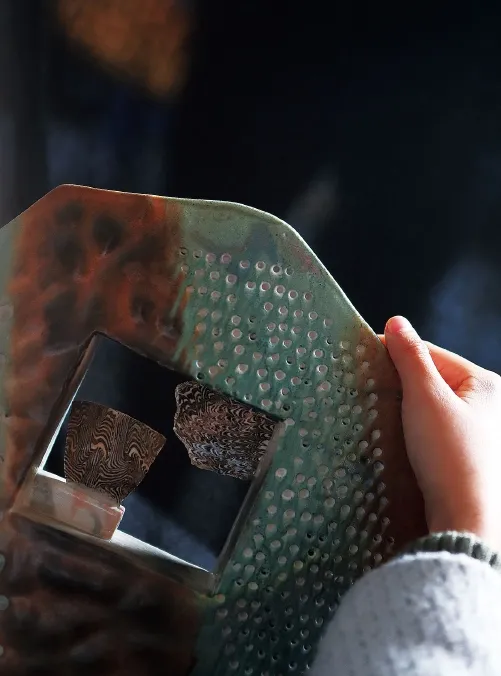
The production process mainly takes four steps: firstly, mix, fold, roll and chip the unneeded debris; next, stretch and mould press the clay into shape, forming a colourful clay body; thirdly, creating a flowing pattern by spinning the clay body; lastly, burn the semi-finished work in the kiln.
绞胎瓷的制作大致分为四个步骤:首先,把各种颜色的胎泥交替糅合、折叠、盘卷、切刮,经拉坯或模压成型;然后,粘贴、镶嵌、拼接成一个多色相间的坯体;接着,借助外力施彩,使彩料在胎体的倾斜状态或旋转运动中,形成具有流动美的绞花纹饰;最后再入窑烧制。
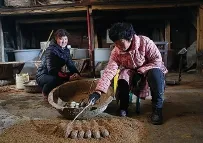
Preserving the Past
NIHAO: Why are Wuliyuan preserved duck eggs especially delicious?
Li:The eggs' taste is largely benefited from the rivers and mountains nearby. Taihang Mountains have contributed to many streams and fertile soil around Wuliyuan district, which is beneficial for breeding ducks. Besides, the mountain spring water is full of mineral substances and microelements, including a parasite called “live stone”. After eating this kind of parasite, ducks in this area produce bigger and more nutritious eggs with thinner shells and a red yolk. Also, the well water used during the manufacturing process is cool and sweet, giving a better taste to the preserved eggs. Last but not least, the wood ashes and alkali used are specially collected in Xiuwu. Only this kind of alkali can give birth to the beautiful pine-twig, cedar leaves patterns on the albumen.
NIHAO: How did you pass down the techniques of making Wuliyuan preserved eggs?
Li:The traditional method has been passed down from the generations for the past 800 years. I am its 13thinheritor. Apart from Xiuwu's suitable environment, to make a Wuliyuan preserved egg requires good skills, including a good control of the alkalinity. And these techniques have been taught from fathers to sons. At first, Wuliyuan preserved eggs were only famous in town. Thanks to word of mouth, its good reputation gradually spread out of Henan Province, and soon became a tribute to the royal class. While the need for Wuliyuan preserved eggs grew, they became more valuable, and it sometimes took three to five months for an order to be completed. This is because the manufacturing process is done by hand. Now that the traditional method has been listed amongst Henan Province's intangible cultural heritages, I am convinced that Wuliyuan preserved eggs will one day become popular around the world.
百年松花蛋
NIHAO: 五里源松花蛋为什么特别好吃?
李:修武依山傍水,八百里太行山的山水形成众多溪流,在五里源地区形成水洼和肥沃的土壤,有利于鸭子的养殖。另外,这里的山泉水含有丰富的矿物质和微量元素,其中包括一种叫“活石头”的寄生生物。该地区的鸭子吃了这种虫子后产下的蛋不仅个头大,皮薄,红心,营养价值也高。而制作过程中使用的地下井水也冰冷清甜,使得松花蛋口感更好。此外,五里源松花蛋采用修武特有的山柴灰和土碱等配料,蛋清经过结晶反应,出现像松枝一样的美丽图案。
NIHAO: 五里源松花蛋是如何传承下来的?
李:它的传统制作方法以父传子辈的形式流传至今已经800多年,传到我这里已经是第13代了。除了需要修武得天独厚的生产环境以外,它制作的难度主要在于含碱量的调配,其把控技巧有赖于家族秘传与多年的经验。最初,五里源松花蛋只在乡里有名,后来经过当地百姓口口相传,名声逐渐传出省外,被推荐为进京贡品。全国上下订做松花蛋的人越来越多,而因为它的制作工艺复杂,不能用机器大批量生产,所以最忙的时候一个订单需要等三五个月才能轮到。现在,五里源松花蛋已被列入河南省非物质文化遗产保护名录,也在全国乃至世界各地越来越有名气。
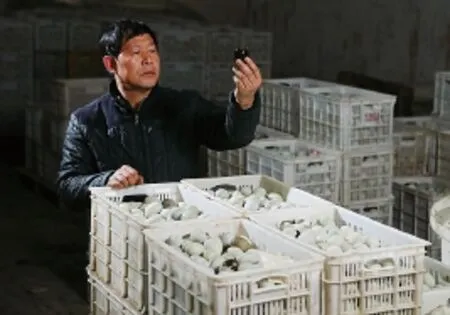
Li Guoshun
Inheritor of Wuliyuan preserved eggs, intangible cultural heritage in Henan Province
李国顺
五里源松花蛋技艺省级非遗传承人

The well water, duck eggs, alkali, etc. used to produce Wuliyuan preserved eggs can only been found in Xiuwu.用于制作五里源松花蛋的井水、鸭蛋、土碱等都是修武特有的。
